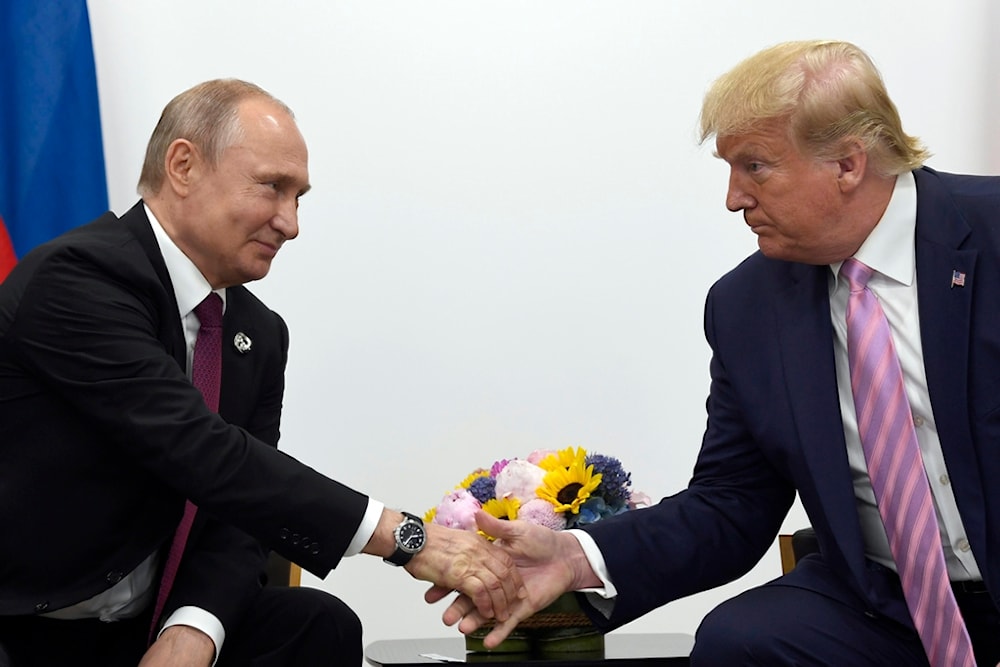Putin seeks halt to Ukraine arms as condition for ceasefire: Bloomberg
While Moscow aims to stop all foreign military aid to Ukraine, at a minimum, it wants US aid to cease, two sources said.
-
 President Donald Trump, right, shakes hands with Russian President Vladimir Putin, left, during a bilateral meeting on the sidelines of the G20 summit in Osaka, Japan, June 28, 2019 (AP)
President Donald Trump, right, shakes hands with Russian President Vladimir Putin, left, during a bilateral meeting on the sidelines of the G20 summit in Osaka, Japan, June 28, 2019 (AP)
Russian President Vladimir Putin is demanding a suspension of all arms deliveries to Ukraine as a condition for a ceasefire proposed by US President Donald Trump, Bloomberg reported on Tuesday, citing sources familiar with the matter.
Putin and Trump are scheduled to discuss the conflict in Ukraine via phone on Tuesday, with a primary focus on establishing a 30-day truce that Kiev has already indicated its willingness to accept. Kremlin spokesperson Dmitry Peskov stated that the call is expected to take place between 4 pm and 6 pm Moscow time.
Putin, who recently met with a Trump envoy, has made halting arms supplies a prerequisite for agreeing to the ceasefire, according to a senior European official and three sources in Moscow familiar with Russia’s position.
While Moscow aims to stop all foreign military aid to Ukraine, at a minimum, it wants US aid to cease, two of the sources said.
Bloomberg cited the senior European official as saying that European nations are strongly opposed to suspending weapons deliveries, arguing that such a measure would allow Russia to rearm while leaving Ukraine vulnerable during the ceasefire.
Putin has expressed conditional support for the US proposal but insists on specific terms before agreeing to pause hostilities. The news website reported on March 12 that the Russian leader is likely to accept a truce, but only after ensuring his conditions are met.
Meanwhile, the UK and the European Union are accelerating efforts to send additional military aid to Ukraine, the report noted.
The ceasefire proposal emerged from a day of US-Ukraine talks in Saudi Arabia last week. The Trump administration subsequently lifted a temporary halt on arms shipments and intelligence-sharing, which had been imposed to push Ukraine toward diplomatic negotiations.
The proposed truce is seen as the first step toward a broader peace agreement. However, the Trump administration has already signaled a willingness to accommodate Russian demands, including allowing Moscow to retain control over some Ukrainian territories and urging Kiev to abandon its NATO aspirations. This has sparked concerns in Europe that any US-Russia deal could leave Ukraine weakened and vulnerable.
Ukraine will not agree to any compromise: Minister
On his part, Ukrainian Foreign Minister Andrii Sybiha stressed on Tuesday that his country will not accept any peace agreement that compromises its sovereignty, territorial integrity, or right to join military alliances.
Speaking at a security conference in New Delhi, Sybiha emphasized that Ukraine would reject any restrictions on its military capabilities and would not recognize any territory under Russian occupation.
“We are not the obstacle to achieve peace,” the Ukrainian minister said during a panel at the Raisina Dialogue, adding, “We do really expect from the Russian side unconditional yes for a ceasefire.”
While Kiev and its European allies remain concerned that Trump may push for a settlement on Russia’s terms, Sybiha underscored that Ukraine would not agree to any compromise reached without its direct involvement.
“Nothing about Ukraine without Ukraine, nothing about Europe without Europe,” he emphasized.
Analysts suggest the US may also push Ukraine to adopt a neutral stance and agree to limitations on its military capabilities, aligning with Russian demands. Cliff Kupchan, chairman of the New York-based Eurasia Group and a former senior State Department official, noted that the suspension of arms supplies would likely be temporary, with deliveries resuming after a peace agreement that imposes constraints on Ukraine’s military.
Since the start of the war in February 2022, Ukraine has increased its domestic arms production from covering 10% of its military needs to more than 30%, but it remains dependent on foreign supplies for advanced weaponry, according to Bloomberg. Europe currently provides about 30% of Ukraine’s arms, while the US supplies 40%.
Read more: Berlin sent Kiev 24 MRAPs, thousands of military equipment in a month

 4 Min Read
4 Min Read









